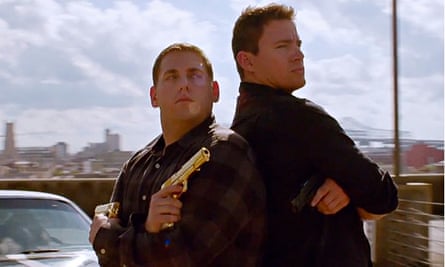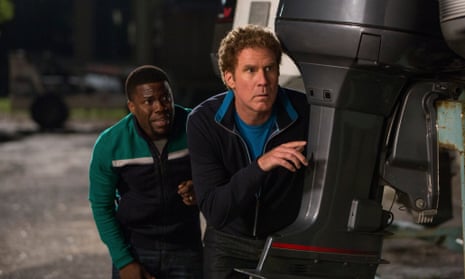In the new Will Ferrell/Kevin Hart comedy Get Hard, an appealing comic premise is established in a slick studio comedy manner, complete with trailer-ready sight gags and a radio-friendly pop soundtrack. Ferrell’s character, a disgraced investment banker, is heading to prison in 30 days and he enlists Hart’s struggling car-washer to help him prepare, leading to a variety of farcical situations. But reviews have been mostly toxic, with Variety calling out “some of the ugliest gay-panic humour to befoul a studio release in recent memory” and The Playlist labelling it “more offensive than just about anything we’ve seen lately.”
It’s a regrettable misfire as the stars are likable, their chemistry is strong and there’s an amusing initial attempt to challenge stereotypes (Ferrell wrongfully assumes Hart has done time because of his ignorant racial profiling) but as soon as prison prep begins, an alarming cloud arrives, throwing a dark, stifling shadow over the film. Ferrell’s pre-prison fears cover the threat of violence rather briskly while his reduced freedom is barely mentioned. But the overwhelmingly dominant phobia that takes over the film relates to his concerns over being raped on the inside.
The film then becomes a seemingly endless slog through a series of tiresome jokes related to avoiding, or even glumly accepting, having sex with a man, or a series of them, once on the inside. The film’s unarguably wretched low point arrives when Hart’s character takes Ferrell to a gay brunch “hookup spot” where he tells him he’ll need to learn to perform oral sex to make his time in prison easier. While being eyed up by every gay man around them, Hart informs Ferrell of the relative ease of approaching a gay stranger for sex, because “that’s what they do”. After Ferrell immediately gets the attention of the depressingly used Matt Walsh, of Veep fame, he proceeds to attempt an unsuccessful bathroom-stall tryst, which disgusts him in such graphic detail that he can’t go through with it. Meanwhile, Hart is approached by a predatory older gay man who, even after finding out Hart’s heterosexuality, refuses to take no for an answer.
Now, there’s an important distinction to make here. The fear of rape is obviously legitimate and a man’s fear of being raped by another man while in prison is also understandable and by no means homophobic. It makes sense that the film would at least address this but what makes less sense is why the writers have such an obsession with the idea. It punctuates every other line of dialogue and not even in particularly inventive ways (the script is essentially multiple, exhaustive variations on “you’re going to get raped”).
But this fear of rape turns into something far more insidious when it extends into a general fear of gay sex and then a fear of homosexuality in general. We go past the dick jokes and find an underlying repulsion (moral of the story: gay sex is ewwww gross) that drives the film and delivers an uncomfortable brand of humour that has been largely absent, or at least tempered, in recent comedies.
Both stars have been forced to defend the jokes during press for the film, in variously unsuccessful ways. During one particularly uncomfortable interview with Louis Virtel on HitFix, Hart simply said: “Funny is funny, regardless of what area it’s coming from”, while Ferrell has said: “We’re playing fictitious characters who are articulating some of the attitudes and misconceptions that already exist.” Justifying the reactions on screen as indicative of what these two, or many straight men, would really think only goes so far as a cover, especially when the film decides to include, and make an unholy mess of, gay characters as well.
Hart’s admirer in the gay brunch scene crops up later, as a pitiful attempt to show the film’s acceptance of gay characters, when Hart offers relationship advice over the phone. But the running joke of him desperately trying to convert a straight man remains. It’s an ugly and lazy form of stereotyping that director Etan Cohen strangely claims was his way of showing how “comfortable” the pair are together.

Get Hard arrives at a strange time for Hollywood. Humour derived from gay panic has progressed into the bromance comedy, typified by films such as I Love You, Man and Superbad, where straight male characters learn to be comfortable at expressing emotion with one another, without fear of it being misinterpreted. Last year’s 22 Jump Street went one step further with a leading duo whose intimate friendship resembled a relationship, and even included a scene where Channing Tatum chastised a bad guy for using the word “faggot” as inappropriate.
The dated homophobia in Get Hard is surprisingly old-fashioned but sadly not an isolated instance, even in contemporary films. Michael Bay’s back catalogue, up to and including last year’s Transformers: Dark of the Moon, is full of badly judged gay jokes (check out this hideous montage) and this year’s first Kevin Hart comedy The Wedding Ringer was also packed with uneasy moments (The AV Club’s AA Dowd called it “a 100-minute gay joke”).
This weekend, Get Hard is predicted to be a big hit with an estimated $40m gross in the US despite a collection of toxic reviews. If it is as successful as analysts suggest, it, and the relative lack of non-stereotypical gay characters in mainstream cinema, makes an interesting comparison to the treatment of homosexuality on TV. In the US, two of the season’s biggest new network shows, Empire and How to Get Away with Murder, both feature central non-clichéd gay men while a study showed that the number of LGBT characters on TV is growing. Hollywood needs to catch up or risk getting soft.

Comments (…)
Sign in or create your Guardian account to join the discussion